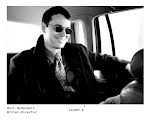_/ ][
I'm now in pre-production on a short film I'm directing
taken from an episode in Harry Swan Jr's memoir Alter Ego.
Swan Jr. is doing the voice-over narration, but more than
that he's been answering my questions. I asked him if he didn't
think it was a problem for magicians getting married when
deception is their profession and life-blood while marriage
is based on trust and honesty.
"It's tricky," he said, quoting one of my own films back
at me, then he pulled one of his business cards from his
coat pocket and handed it to me. "Check and see there's
no other card in my pocket." I looked. There was no
other card.
"Turn it over," he said.
On the back he had written, "I knew you'd ask this
sooner rather than later. Choose an odd number
between 10 and 50 in which the two digits are not
the same. For instance 11 would not work but
15 would be fine."
It took me a moment to understand the
instructions, but then I looked up at him and
said 37. He smiled slightly and handed me a copy
of Alter Ego. Before I opened to page 37, I knew
what would be printed there:
Any average magician knows that when a move designed to be secret is spotted by the audience, the trick is to some degree exposed even if the exact mechanics remain unknown. On the other hand, a gesture that looks like a secret move when the sleight has already occurred can be the perfect misdirection, and in retrospect make a rather simple trick look life a miracle.
Here, the confident magician is able to let the alert spectator think herself into an inescapable corner. By thinking she has spotted the crucial move, she feels she has some sense of how the trick was effected and goes home feeling a bit superior to most, if not all, in the audience. She goes to bed in innocence and peace only to wake with the realization that the trick could not have possibly been done the way she thought.
She does not go back to sleep but spends days and nights racking her brain, all hope of discovering the right method thwarted by the precious bit of misinformation she holds onto and which she keeps using as the foundation to work out a new variation which will hold up under her astute scrutiny. It does not take long for her obsession with knowing to turn to an obsession with the magician who knows.
It ends in marriage - or from another perspective begins - and on the wedding night she withholds the expected favors until the truth be given to her. The magician faces a dilemma. Beyond his sacred duty to his art, he must ask himself: will he lose his hold on his love when she learns how banal was the artifice, how simple the ruse for which she fell? Will she still love him when she no longer needs him to free her from the impossible place in which she has cornered her mind?
The confraternity holds that whether the two will make a relatively happy or the most miserable of unions depends on how the delicate matter is handled, i. e., he must find a way to satisfy her without actually exposing the banality of the magic which has fascinated her for so long, that is he must lie to her and effectively. If he tells the truth, she will never forgive him for being a magician.
How often has this old scenario played itself out one way or the other in the backstage annals of magic? Many, many times certainly, second probably only in frequency to the endless variations of the magician becoming obsessed with his assistant - always futilely, it need not be added, as a magician is nothing without his secrets, which his assistant believes that she already knows.
][
Sunday, August 29, 2010
The Domestic Life of Magicians
Subscribe to:
Post Comments (Atom)

No comments:
Post a Comment